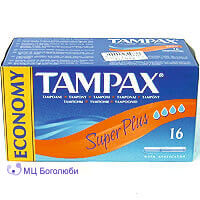Toxic shock syndrome - is a multisystem inflammatory response of the body to exotoxins of bacterial strains. Most often, this reaction occurs as a result of vaginal colonization by bacteria during menstruation.
Toxic shock syndrome was identified in the early 80s in the United States, where about seven hundred cases were recorded. All women affected by toxic shock syndrome used hygienic tampons.
After the event received a wide response and caused a widespread public campaign against the use of tampons, the incidence rate declined sharply. Although women have become more aware of the dangers associated with the use of a tampon, and on each «tampax » package, the manufacturer honestly warns of the existing risk in small print so that later she will not sue the relatives of the deceased client, few of us take these warnings with proper seriousness. It seems to us that the danger of the syndrome is greatly exaggerated. They write on a pack of cigarettes: «Smoking causes cancer». So what? Is it because of this people began to smoke less? And, despite the warning inscriptions, the layman frivolously continues to use a dangerous product, hoping exclusively for «maybe». Here the Americans died, and maybe it will blow me over. Is not a fact. Better safe than sorry.
Symptoms of Toxic Shock
Syndrome Currently, the form of toxic shock syndrome, defined as «menstrual» accounts for approximately 70% of all clinical cases of the disease. Next to this form, there is another, «non-menstrual», сassociated with severe infection, including in-patient origin. Bacteria grow rapidly, causing an immune response:
- diffuse erythematous rash;
- drop in blood pressure;
- rise in temperature to high rates.
Bacterial exotoxins can lead to the involvement of other organs and systems of the body, unexpected pathological changes in which lead to death.
Early diagnosis and adequate treatment prevents the progression of the disease and the development of possible complications, and also gives a good chance of recovery.
Causes of Toxic Shock Syndrome
The exact causes of toxic shock syndrome are not yet fully established by scientists, but in most cases the disease is associated with strains of Staphylococcus aureus.
Staphylococcus aureus is a synanthropic microorganism of the skin and mucous surfaces of a person and can coexist with the «host», for a long period without causing disease or colonization. Тем не менее, у некоторых людей не вырабатываются антитела к стафилококку, и может развиваться синдром токсического шока.
However, some people do not develop antibodies to staphylococcus, and toxic shock syndrome may develop. Toxic shock syndrome caused by streptococcus can occur as a secondary infection, for example, against the background of the flu.
Factors of Toxic Shock Syndrome
Toxic shock syndrome «not menstrual» occurs in men and women of all ages. The exact etiology of the syndrome, as mentioned above, has not yet been determined, but cases of the disease are associated with:
- the use of vaginal tampons;
- the use of antibiotics;
- streptococcal and staphylococcal infections;
- some methods of contraception (diaphragm, cylindrical polyurethane sponge soaked in spermicide);
- gynecological infections;
- postpartum sepsis (a severe infection of the uterus that occurs after childbirth or abortion).
Scientists cannot unambiguously answer exactly how a tampon provokes toxic shock syndrome. One theory says that the swab becomes a breeding ground for bacteria due to the long time in the vagina.
Prevention of Toxic Shock Syndrome
Women who use tampons should be aware of the following precautions:
- do not use tampons if the bleeding is very light
- «Switch» to pads;
- Keep the swab bag in a clean and dry place, not in a wet and warm bathroom;
- wash your hands with soap before and after setting the swab;
- it is better to use a swab with less absorbency if you experience difficulty or irritation when removing it.
Before purchasing another pack of tampons, weigh all possible risks well. And to paraphrase the famous driver’s aphorism, in conclusion of all that has been said, we recall: «You aren’t not sure - don’t buy.”».
















